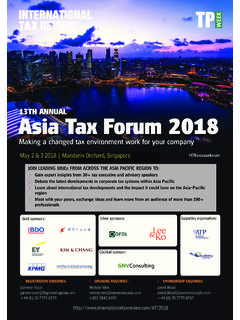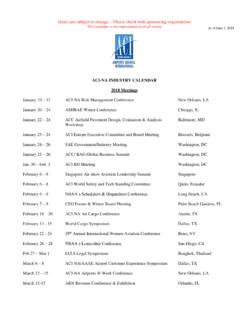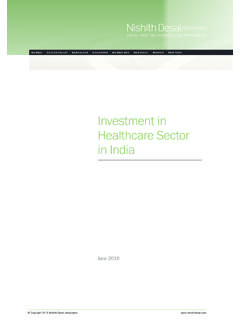Transcription of OECD Agricultural Codes and Schemes
1 2016 Seed Schemes Forest Seed and Plant Scheme Fruit and Vegetables Scheme Tractor Codes OECD Agricultural Codes and Schemes C o n t e n t s The OECD s core values 2 Strategic Orientations by the Secretary-General 3 OECD Meeting of Agriculture Ministers 4 OECD and the G20 7 OECD in Brief 9 Trade and Agriculture Directorate 10 Agricultural Codes and Schemes 12 Global Relations 14 The OECD s Relations with its Key Partners 16 OECD Active 17 About the OECD Eurasia Competitiveness Programme 18 Countries participating in the Tractor Codes in 2016 19 OECD Tractor Codes 21 OECD Tractor Codes and ANTAM 39 OECD Tractor Codes in Asia 40 OECD Tractor Codes Meetings in 2016/17 42 Miscellaneous Information 45 OECD-FAO Agricultural Outlook 2016-2015 46 Getting to the OECD Headquarters 49 2 OECD Headquarters, Paris - France The OECD s Core Values Objective: Our analyses and recommendations are independent and evidence-based.
2 Open: We encourage debate and a shared understanding of critical global issues. Bold: We dare to challenge conventional wisdom starting with our own. Pioneering: We identify and address emerging and long term challenges. Ethical: Our credibility is built on trust, integrity and transparency. 3 Strategic Orientations by the Secretary-General Angel Gurr a, Secretary-General of the OECD Strategic Orientations of the Secretary-General 2015 and beyond Key Partner and Accession Countries 53. The OECD will continue to integrate Key Partner Countries (Brazil, China, India, Indonesia and South Africa) into the work of the OECD. This includes encouraging them to join OECD bodies, adhere to legal instruments and establish mechanisms for jointly identifying mutually beneficial work priorities.
3 The Organisation will build on the strategic relationship developed with China over the past year. This year marks the 20th anniversary of co-operation with China. A joint work programme for 2015-16, includes supporting China in its G20 Presidency, in particular in the fields of inclusive growth, new sources of growth like innovation and skills, trade and investment and the fight against corruption. China has also announced that it will join the Development Centre, which will further strengthen co-operation. A joint work programme with Indonesia provides the basis for deeper engagement with the country in 2015-16 with the support of the newly established OECD Office in Jakarta, which will engage with the whole of Southeast Asia.
4 Brazil has also expressed its willingness to sign a framework agreement with the OECD and to develop a joint work programme. We will also strive to create similar arrangements with India and South Africa. Full Report available on the public website 4 Meeting of Agricultural Ministers On 7-8 April 2016, the Directorate for Trade and Agriculture (TAD) hosted a Meeting of Agriculture Ministers at OECD Headquarters. Ministers from OECD countries and partner economies discussed Better Policies to Achieve a Productive, Sustainable and Resilient Global Food System, assessing whether existing government policies are well targeted to address emerging issues and public priorities.
5 The event was a follow-up to the last OECD Agriculture Ministerial meeting held in February of 2010. The objective of the discussions were to highlight the common policy priorities of governments confronting both opportunities and challenges in feeding a growing world population, managing its resources, and dealing with climate change. For more information about the event please go to the link: Why a meeting of ministers? Ministers of Agriculture from OECD countries and partner economies around the world met at OECD headquarters in Paris on 7- 8 April 2016, to discuss Better Policies to Achieve a Productive, Sustainable and Resilient Global Food System.
6 Ministers explored the new policies needed to achieve this widely shared interest, and exchanged on how to ensure that existing policies begin to shift in these directions more quickly. Agriculture Ministers last met at the OECD in February 2010, in the midst of volatile world food markets. Six years later, and as requested by Ministers, it is again time to assess whether the policies governments are pursuing are well targeted to address emerging issues and public priorities. Population growth and increasing prosperity are driving and changing demand for Agricultural products. The sector will need to adapt to climate change, including to the expected increased frequency of extreme events, and will also have to be part of the mitigation effort.
7 There will be increased competition for limited natural resources, in particular water. Against this background Ministers: exchanged ideas about which policies would best accompany the sector in responding to these opportunities and challenges and how to manage the transition to a new policy framework; covered the entire food chain, with a strong focus on the knowledge and innovation systems needed to achieve sustainable productivity growth; discussed how to strengthen global collaboration to that end, including through trade, science and technology, and education and advisory services; reflected on how the food system can contribute to the overall well-being of their economies, and on how overall policy settings can be more conducive to achieving sustainable productivity growth in the global food system.
8 This meeting of Agriculture Ministers comes in the wake of several other important high-level events: the G20 Agriculture Ministerial under the Turkish Presidency of the G20 in May 2015, the UN Special Summit on Sustainable Development in September 2015, the COP21 in November-December 2015, the WTO Ministerial Conference in December 2015, and Germany s Global Forum for Food and Agriculture in January 2016. 5 6 7 WHAT IS THE G20 The G20 is a forum of 19 countries plus the European Union, representing both developed and emerging economies whose size or strategic importance gives them a particularly crucial role in the global economy. Its role is to co-ordinate policies at the international level and to make globalisation a smoother, more harmonious and sustainable process.
9 The countries are: Argentina, Australia, Brazil, Canada, China, France, the European Union, Germany, India, Indonesia, Italy, Japan, the Republic of Korea, Mexico, Russia, Saudi Arabia, South Africa, Turkey, the United Kingdom, and the United States of America. Following the largest financial, economic and social crisis in decades, the world s twenty most influential economies decided to meet at the Leaders level for the first time in November 2008 in Washington The purpose of the meeting was to cope with the most current challenges of the escalating economic and financial crisis. Following that first meeting, the G20 was officially designated as the premier forum for economic co-operation at the Pittsburgh Summit in September 2009.
10 MAJOR ACHIEVEMENTS Since they first met in 2008, the G20 Leaders have taken decisive action to prevent future financial crises, while securing sustainable and balanced global growth and reforming the architecture of global economic governance. The decisions made by the G20 have been key to the stability of the global economy at the height of the crisis and to avoiding an outright collapse of the international financial system. For instance, G20 leaders endorsed in 2009 the largest internationally-coordinated stimulus package in history. They also committed to keeping markets open and launched a major overhaul of the international financial and prudential regulation framework, as well as of the international tax architecture.















